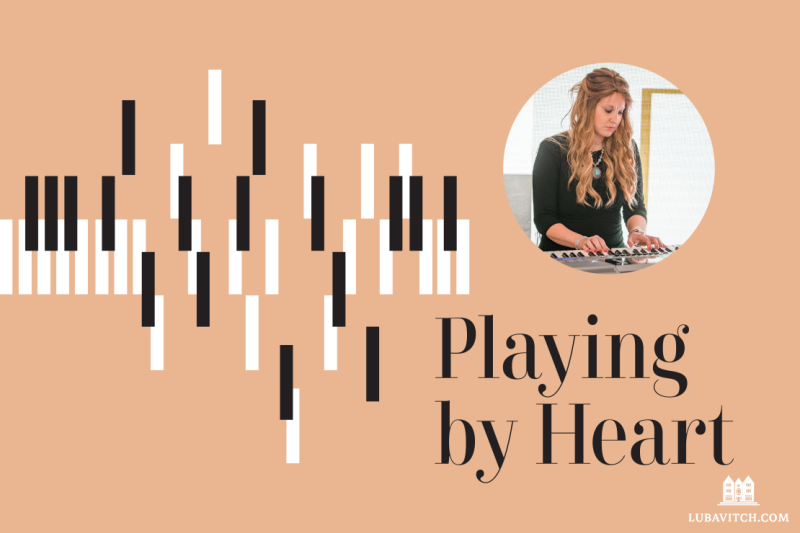
Playing by Heart
by S. Schreiber – Lubavitch.com
In January the largest satellite radio provider in America, SiriusXM, added a track to its “Spa” channel from a new, emerging artist. “Eyes That Sparkle,” a solo piano composition by Sarah Dukes, joined a rotation that includes new-age music pioneer Steven Halpern, the German electronic band Tangerine Dream, and Enya. By definition, this sort of ambient music strives not to attract attention; but Dukes’s work, which is born of her experiences as a psychotherapist and a widowed Chasidic mother raising six children, is worth a closer look.
As a composer, Dukes is entirely self-taught—her fluid, meditative music follows only the rules prescribed by her ear and her heart. They have not led her astray. Dukes’s 2016 album Life Sometimes earned a silver medal from the Global Music Awards and a Grammy nomination. Her work has been used in network television shows and featured on the in-flight entertainment systems of Singapore Airlines and EgyptAir, among others. In her own life, music has been both a mirror and a balm for her soul, Dukes told me, offering her a way to cope with extraordinary challenges while simultaneously sharing her resilience with others.
Dukes grew up in North Carolina and began composing at the age of eight, when her parents insisted the delinquent piano student spend at least twenty minutes at the instrument every day. “I started playing around with the keys and hearing different notes and just experimenting,” she recalled. “At a certain point I realized, Whoa, there are so many more sounds that can be created that go way beyond my piano books.”
As an adult, what draws Dukes to the piano is tension. “When I compose, I’m seeking a release for something—I don’t always know what triggers it,” she said. Her pieces are brief by new-age standards, around three minutes long, with recognizable melodic motifs that vary and evolve as she probes emotional territory. While her creative process allows for maximal freedom, it also has drawbacks: “Sometimes it can take me a lot longer, because I have to play around until I find the sound that’s like, Ah, that’s it.” In the occasional moments of stillness, one can almost hear her gathering her thoughts, taking a breath.
Even in the absence of lyrics, the determination to find beauty in pain—perhaps the defining characteristic of Dukes’s work—is unmistakable.
Following her ear also regularly brings Dukes beyond the range of her own technical skill as a pianist: all of her albums are performed by other musicians, many by Israeli composer and producer Yaron Gershovsky.
Though sadness is often the impetus for Dukes to begin composing, her music is never dark. Faith informs every aspect of her art. She hesitated for a long time to release her music, she told me, fearing the vulnerability that wide exposure would bring. “But at some point I realized that my attitude was disrespectful,” she said. “If G-d gave me this talent, then I’m meant to use it, I’m meant to share it.” Even after three albums and multiple singles, her music is so deeply personal that only a Higher Authority could convince her to publish, she said: “I write for myself. I share it for G-d.”
It was faith, and music, that sustained Dukes through her husband’s ten-month battle with Covid-19. A Chabad representative and founder of JNet, a platform that pairs people around the world for one-on-one study sessions, Yudi Dukes suffered extensive complications from the virus, including lung collapse, stroke, and liver failure. The family’s ordeal drew attention throughout the Jewish world and beyond, in large part because of Dukes’s social media posts at the time. She candidly shared her experience, asked people to perform mitzvahs on her husband’s behalf, and asserted her faith that her husband would recover. Occasionally she shared videos of herself at the piano. In the comments sections of her daily posts, a community of Jewish and non-Jewish admirers emerged for whom Dukes’s faith and music were one.
Throughout those ten months, which Dukes described as “crazy, crazy, crazy hell,” she kept writing music. It was an outlet for her, as always, but she knew it wasn’t only for her. “I think that the power of music, and specifically instrumental music, is the interpretation left up to the listener—and that’s what healing is about,” she said. “That’s what can be an emotional catharsis for the listener.” Dukes’s newest release, Washed Away (featuring the hit “Eyes That Sparkle”), is her first EP since her husband’s death in 2021. The tempo is slower than in her previous work, the tones more subdued, but the impression is one of questioning and contemplation rather than grief. Even in the absence of lyrics, the determination to find beauty in pain—perhaps the defining characteristic of Dukes’s work—is unmistakable.
This article appears in the Spring/Summer 2025 issue of Lubavitch International, to subscribe to the magazine, click here.









